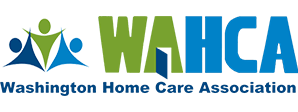We are actively working with the Department of Health to better understand the timing and process of Covid-19 vaccinations for home care workers who are part of the DOH issued phase 1a.
DOH has confirmed that the current vaccine supply in Washington is very limited. DOH is currently working with health care systems and hospitals to determine those who are interested in offering to vaccinate phase 1a workers that are not employees of their system. DOH is also exploring how they can stand-up additional sites such as pharmacies or points of distribution (POD) where home care workers can be referred for vaccination.
It sounds likely that it will be January before there will be sufficient vaccine supply for home care workers to access vaccines; and several weeks before enough details around distribution will be known to provide detailed instructions to home care agencies and Individual Providers. We will also learn more in the coming weeks about whether there is enough supply to cover all home care workers with a single announcement or whether there will need to be risk stratification and notification of phases of workers over a period of time within 1a prioritization.
We have additional questions we have sent to DOH; and we are still seeking to understand whether other HCBS providers who are doing in-person visits to Medicaid clients are included in phase 1a.
Here is what we do know:
- Home care and home health workers are identified in phase 1a
- DOH has provided approval of a draft template letter that can be utilized as verification for Individual Providers, home care agency workers, and nurses contracted with the department who provide in-person services.
- Additional details around when, where and how to access the vaccine are needed before we issue verification template letters.
- The letter will be issued directly to individual providers, contracted nurses and to Medicaid contracted home care agencies.
We commit to keeping you informed along the way. It is very good news that in-home workers have been recognized for the essential work they perform; and for the COVID exposure and spread risk they experience as a result of the tasks they do to assist individuals to remain living in their own home.
Sincerely,
Bea
Bea Rector / Director, Home and Community Services Division
Aging and Long Term Support Administration
Washington State Department of Social and Health Services
Transforming Lives
